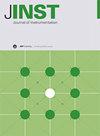HL-3托卡马克上紧凑多色器的边缘汤姆森散射诊断
IF 1.3
4区 工程技术
Q3 INSTRUMENTS & INSTRUMENTATION
引用次数: 0
摘要
摘要:最近在HL-3托卡马克上发展了紧凑多色器边缘汤姆森散射诊断技术。Nd: YAG激光器的能量为2.0 J,重复频率为30 Hz。激光束在等离子体区域垂直传播,散射光在水平方向上被观测到。等离子体中部的投影散射区域为0.6 <r / & lt;1.0. 研制了5通道紧凑型多色仪(宽432 mm,深472 mm,高88 mm)用于测量汤姆逊散射光谱。电源和放大器电路的模块化设计简化了多色仪的组装和维护。采用截止深度大于OD 4的窄带滤光片,多色器抑制了Nd: YAG激光产生的杂散光。每个通道的信噪比(SNR)范围从10到200,取决于等离子体参数。设计的电子温度测量范围为5 ~ 1000ev,电子密度测量范围为5 × 10 18 ~ 1 × 10 20 m -3。将ETS对电子温度的新测量结果与电子回旋辐射(ECE)辐射计的测量结果进行了比较。在不同的等离子体放电条件下,ETS和ECE的时间演化是一致的。结合核心汤姆逊散射诊断系统的数据,首次给出了HL-3托卡马克的等离子体电子温度分布。本文章由计算机程序翻译,如有差异,请以英文原文为准。
Edge Thomson scattering diagnostic with compact polychromators on the HL-3 Tokamak
Abstract The edge Thomson scattering (ETS) diagnostic with compact polychromators on the HL-3 Tokamak was developed recently. The energy and repetition frequency of the Nd: YAG laser are 2.0 J and 30 Hz, respectively. The laser beam propagates vertically through the plasma region and the scattered light is observed horizontally. The projected scattering region at the plasma midplane is from 0.6 < r/a < 1.0. The 5-channel compact polychromator (width 432 mm, depth 472 mm and height 88 mm) is developed to measure the Thomson scattering spectra. Modular design in the power supply and the amplifier circuits simplifies the assembly and maintenance of the polychromator. By using the new narrow band filters with cut-off depth larger than OD 4, the stray light resulted from Nd: YAG laser has been suppressed by the polychromator. The signal to noise ratio (SNR) range of each channel is from 10 to 200 depending on plasma parameters. The designed electron temperature measurement range is from 5 to 1000 eV and electron density measurement range is from 5 × 10 18 to 1 × 10 20 m -3 . New measurement results of electron temperature by ETS are compared with that from the electron cyclotron emission (ECE) radiometer. The time evolution of ETS and ECE matches with each other in different plasma discharges. Combined with the data from the core Thomson scattering diagnostic system, the plasma electron temperature profile on the HL-3 tokamak is presented for the first time.
求助全文
通过发布文献求助,成功后即可免费获取论文全文。
去求助
来源期刊

Journal of Instrumentation
工程技术-仪器仪表
CiteScore
2.40
自引率
15.40%
发文量
827
审稿时长
7.5 months
期刊介绍:
Journal of Instrumentation (JINST) covers major areas related to concepts and instrumentation in detector physics, accelerator science and associated experimental methods and techniques, theory, modelling and simulations. The main subject areas include.
-Accelerators: concepts, modelling, simulations and sources-
Instrumentation and hardware for accelerators: particles, synchrotron radiation, neutrons-
Detector physics: concepts, processes, methods, modelling and simulations-
Detectors, apparatus and methods for particle, astroparticle, nuclear, atomic, and molecular physics-
Instrumentation and methods for plasma research-
Methods and apparatus for astronomy and astrophysics-
Detectors, methods and apparatus for biomedical applications, life sciences and material research-
Instrumentation and techniques for medical imaging, diagnostics and therapy-
Instrumentation and techniques for dosimetry, monitoring and radiation damage-
Detectors, instrumentation and methods for non-destructive tests (NDT)-
Detector readout concepts, electronics and data acquisition methods-
Algorithms, software and data reduction methods-
Materials and associated technologies, etc.-
Engineering and technical issues.
JINST also includes a section dedicated to technical reports and instrumentation theses.
 求助内容:
求助内容: 应助结果提醒方式:
应助结果提醒方式:


